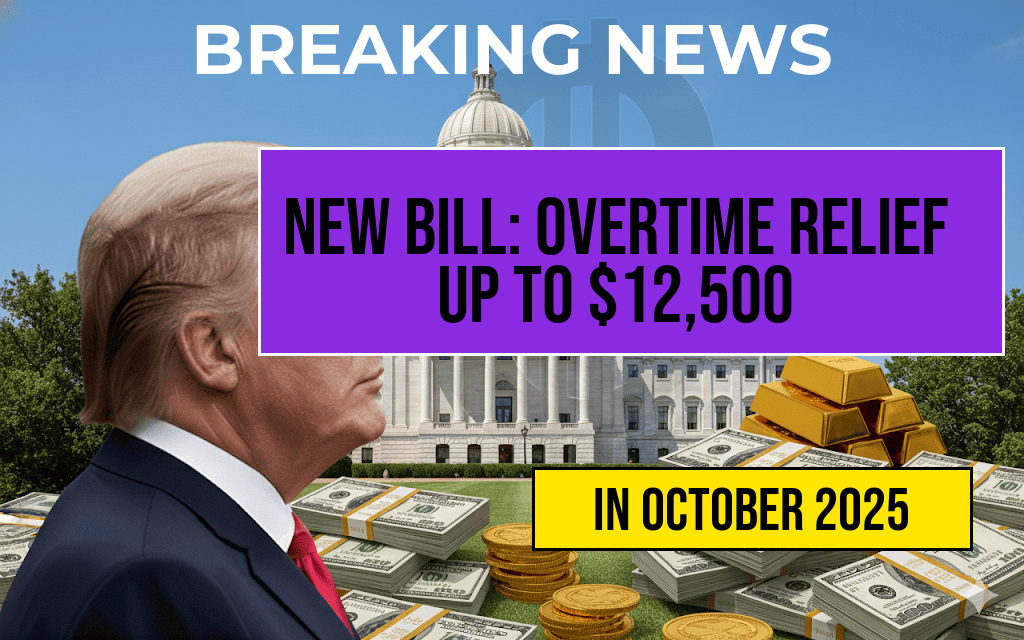A new legislative proposal aimed at providing overtime relief has garnered attention as it promises to protect up to $12,500 of overtime pay from taxation. Introduced in Congress, the bill seeks to alleviate financial pressures on workers who often face taxation on their hard-earned overtime. If enacted, this legislation could significantly impact many American employees, particularly those in sectors where overtime work is common. The bill’s supporters argue that it is critical to ensure that workers can retain a larger portion of their earnings, especially in an era of rising living costs. As discussions unfold, employees and employers alike are eager to understand how the proposed measures would alter their financial landscapes and whether this initiative could pave the way for more comprehensive labor reforms.
Details of the New Bill
The proposed bill, referred to as the Overtime Protection Act, aims to amend existing tax regulations that apply to overtime compensation. Currently, many employees find themselves in higher tax brackets due to their overtime earnings, which can lead to a significant reduction in take-home pay. Here are the key features of the bill:
- Overtime Tax Exemption: The legislation proposes that up to $12,500 of overtime pay be exempt from federal income tax.
- Eligibility Criteria: Employees earning below a certain threshold will qualify for the tax exemption, ensuring that the benefits reach those who need it most.
- Implementation Timeline: If passed, the bill could go into effect as early as next year, pending approval from both chambers of Congress.
Who Would Benefit?
The bill is designed to assist a wide range of workers, particularly those in industries with extensive overtime demands. Professions such as healthcare, hospitality, and construction often require employees to work beyond standard hours. According to recent reports, approximately 30% of American workers regularly earn overtime pay, making this legislation potentially impactful.
Key Demographics Affected
- Hourly Workers: Those who are paid hourly are most likely to benefit, as overtime is a significant part of their income.
- Middle-Income Families: Families with combined incomes that hover near the threshold could see a noticeable difference in their financial situation.
- Low-Wage Earners: The bill seeks to ensure that even low-wage earners who work overtime are not disproportionately taxed.
The Financial Impact
To understand the financial implications of this bill, consider a hypothetical scenario involving an employee who earns an hourly wage of $20. If this employee works 10 hours of overtime in a month, their overtime pay would amount to an additional $300. Under the proposed legislation, if they earn less than the specified income limit, only the amount exceeding $12,500 would be subject to tax. This could lead to significant savings, allowing workers to retain more of their earnings to spend on essential needs.
| Annual Overtime Earnings | Taxable Amount | Estimated Savings |
|---|---|---|
| $15,000 | $2,500 | $500 |
| $20,000 | $7,500 | $1,500 |
| $25,000 | $12,500 | $2,500 |
Challenges and Opposition
While the Overtime Protection Act has received support from various labor groups, it has also faced criticism. Opponents argue that the bill could lead to unintended consequences, such as employers reducing overtime hours to avoid tax liabilities. Some economic analysts warn that the legislation might complicate payroll processing for businesses, particularly small enterprises. The ongoing debate highlights the need for a balanced approach that considers both worker protections and employer capabilities.
Next Steps
The Overtime Protection Act is currently under review in Congress, with discussions expected to intensify in the coming months. Advocates for the bill are calling for public support to push it through, while opponents are mobilizing to raise concerns. As the legislative process unfolds, employees are encouraged to stay informed about how these changes could affect their earnings and tax liabilities. For more information on overtime laws and potential changes, visit reputable sources like Forbes and Wikipedia.
Frequently Asked Questions
What is the main purpose of the new bill regarding overtime?
The new bill aims to provide overtime relief by allowing workers to protect up to $12,500 of their overtime earnings, making a portion of it non-taxable.
How does the bill affect employees’ overtime pay?
The bill enables employees to retain more of their overtime pay by reducing the tax burden on a specific amount, thereby increasing their overall take-home earnings.
Is there a limit to how much overtime can be protected under this bill?
Yes, the bill specifies that employees can protect up to $12,500 of their overtime earnings from being taxed.
When will this new overtime relief bill take effect?
The effective date of the bill will be outlined in the final legislative documents, but it is expected to be implemented soon after passing.
How can employees take advantage of this overtime relief?
Employees should consult their employers or payroll departments to understand how to apply this overtime relief to their earnings and ensure they maximize their non-taxable income.






